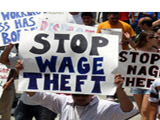Unethical Bosses Making Pay-Checks Lighter Criminally
Post Views 3
For almost a year, jobless home health worker Leslie Gilbert of Grand Rapids, Mich., is seeking more than $400 in unpaid wages from her former employer. Her efforts, till date have been fruitless. She has filed a complaint with the state which has warned her employer to pay her dues by the first of June or face the consequences that included a hearing.
The company sent her a check that did not have a signature. When she informed them that it was not valid, they asked her to return it for the signature. Sick and tired of the company’s delaying tactics, Gilbert said, “I’m so done with this. I’ve tried to rectify this so many times before I ever filed a complaint. There’s no need to get upset and go back and forth about this anymore. If we need a hearing, I’m fine with going for the hearing.”
Wage theft has become more rampant for threefold reasons, the poor economic environment has forced employers to cut labor costs to stay afloat, fewer workers are belonging to unions and have lost out on collective bargaining power with their employers. Law enforcing agencies, both at state and federal levels, losing popularity with the populace for their unpopular budget cutting measures are lenient and not enforcing wage laws as aggressively as they earlier did.
The most persistent ‘wage theft’ measures employed by employers include taking tips that really belong to waiters and restaurant workers, dishonest deductions from a worker’s paycheck or making workers work overtime and not paying them for it and failing to adhere to the legal minimum wage norms. Employers have also been known to categorize regular workers as “independent contractors” to deny them their unemployment insurance.
Millions of workers have fallen victim to such avaricious and unethical practices with the majority of the workers from low-income service industries such as fast food, domestic work, agriculture, retail, hotels, tourism and home health care.
Migrant and undocumented workers in the warehousing and construction industries bear the brunt of such immoral practices. They constantly live under the fear of their immigration status being questioned, putting them at their employer’s mercy and making them amongst the most vulnerable of workers for wage theft.
According to a survey of nearly 4,400 low-wage workers in Chicago, Los Angeles and New York, nearly 2 in 3 low-wage workers experience some form of wage theft each week. Three in 4 were not paid or underpaid and 1 in 4 said they were paid below minimum wage. On average, these workers lost about $51 a week, or $2,634 per year in unpaid earnings, the survey found.
Surveys have shown that 64 percent of low-wage workers face wage theft with every pay-packet that they receive, 26 percent are paid below the legal minimum wage and an incredible 76 percent, almost all, who have put in overtime are not paid for it.
It is estimated that employers in Houston cheat their workers of $753 million every year, in wage thefts. In New York State alone, workers’ losses are estimated at $3 billion per year. Considering that the cities and state lose tax on this money, shows that this cheating affects everybody.
What makes it even worse is that this money is stolen from people who need it most and can ill-afford to lose it.
So rampant is this practice is evident from a new report, titled, Where Theft Is Legal , says if “cracking down on wage theft” were a class, 44 out of 50 states would fail one of the major tests: enacting strong laws against the crime. There is there is only one investigator for every 141,000 workers, so monitoring can at best be random and perfunctory.
New York, Illinois, California, and Massachusetts have mandated strict and innovative policies to help workers get back their wages and convince employers to abandon wage theft, or face dire consequences. Unfortunately, not too many states have followed in their footsteps and have done little to nothing at all.
Tim Hudson, a workers’ rights policy specialist says, “By our estimation New York has the strongest law in the country. But wage theft laws are almost universally poor. In recent years a few states took strong steps, but even those laws have a ways to go before they are a model standard that could really be effective in cracking down on a problem this huge.”
New York’s Wage Theft Prevention Act functions on three planes: punitive, protective and administrative. Employers could be made to cough up as much as 100 percent of the stolen wages. So if the employer is accused of $1000 wage theft, he will have to pay his aggrieved employee $2000, and the more he delays the percentage will keep on increasing.
Workers must be provided with strong legal protection, the risk of losing their jobs is far too great, for the employee to lodge a complaint against his employee. Taking one one’s employer is not easy for low-wage workers, who probably are the only bread earners in the family.
Unethical Bosses Making Pay-Checks Lighter Criminally by Harrison Barnes


 10 Steps to Properly Fire an Employee
10 Steps to Properly Fire an Employee  Cutting Full-Time Employee Hours Can Get You Sued
Cutting Full-Time Employee Hours Can Get You Sued  Home Depot Sued by Two Former Female Employees for Sexual Discrimination
Home Depot Sued by Two Former Female Employees for Sexual Discrimination  Telecommuting Doesn’t Work for All Jobs
Telecommuting Doesn’t Work for All Jobs  Fake FMLA Requests Can Be Overcome
Fake FMLA Requests Can Be Overcome  The New Trend of Defamation Lawsuits
The New Trend of Defamation Lawsuits  Is It Legal to Refuse to Hire Smokers?
Is It Legal to Refuse to Hire Smokers?